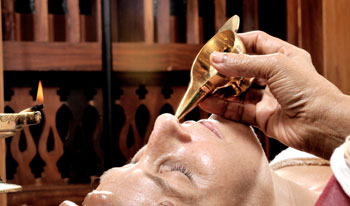
Nasya (Nasal medication):
Nasya is one of the Ayurveda Panchakarma therapies which helps in removal of vitiated doshas from the region above the clavicle especially head and sinuses by instilling liquid medicines through the nose after massage and fomentation of face and neck. This Panchakarma treatment is beneficial in disorders affecting the head, face and neck. Read more Nasya
Nasya: Nasal Administration
The nose is the doorway to the brain and it is also the doorway to consciousness. The nasal administration of medication is called nasya. An excess of bodily humors accumulated in the sinus, throat, nose or head areas is eliminated by means of the nearest possible opening, the nose. Prana, life force as nerve energy, enters the body through the breath taken in through the nose.Prana is in the brain and maintains sensory and motor functions. Prana also governs mental activities, memory, concentration and intellectual activities. Deranged prana creates defective functioning of all these activities and produces headaches, convulsions, loss of memory and reduced sensory perception. Thus nasal administration, nasya is indicated for respiratory disorders, sinus congestion, migraine headaches, convulsions and certain eye and ear problems.